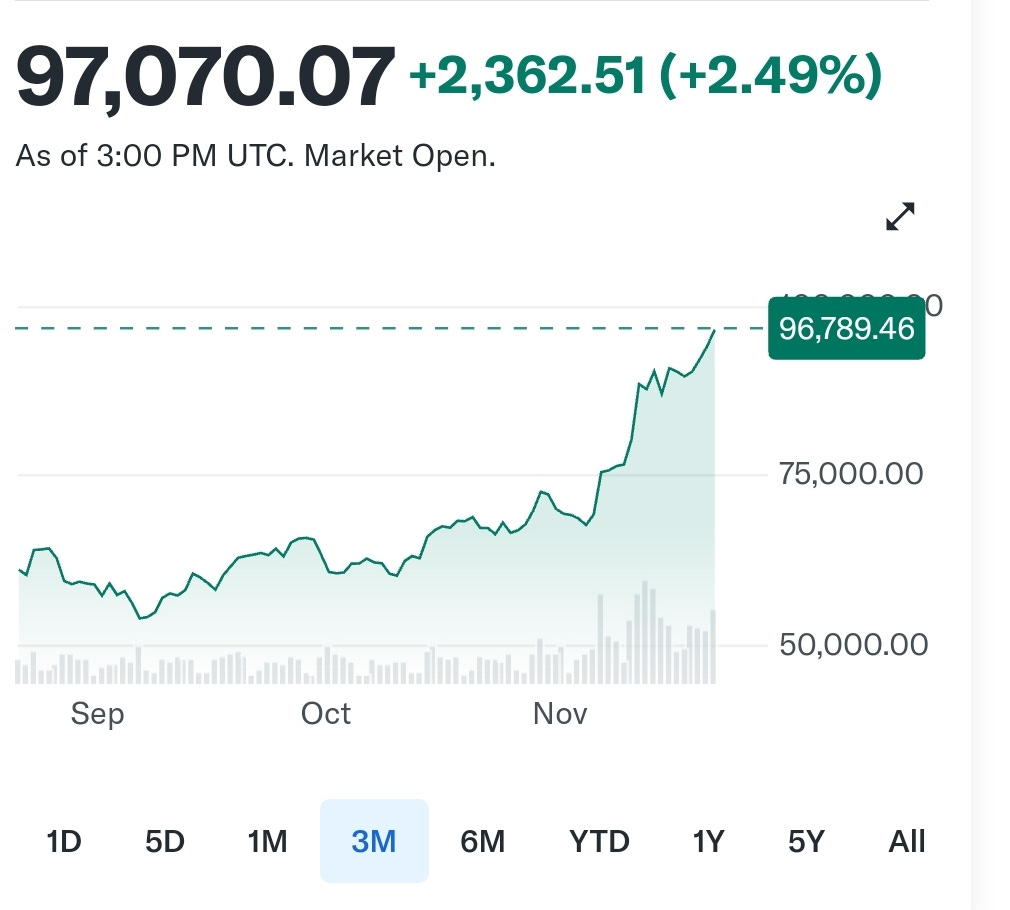I was on the road (airports to be precise) over the last few days, attending meetings in Melbourne, Dubai and Doha. Thanks for your feedback and comments, very encouraging and mainly positive. This week I have decided to add extra video to put some context on my usual weekly 5 mins of fame video which is mainly for the young generation who seem to enjoy the fast paced, even if disjointed thoughts. This week’s post about elections, money and cryptos. enjoy it.
Botswana Elections… was it fair and free election?
There were elections of all sorts in the US, Africa and Somalia and I will share my thoughts on this below. Recent electoral events in Somaliland (North Somalia, Somalia.. whatever it takes), the United States, and Lesotho have each presented unique developments, reflecting the diverse political landscapes and democratic processes within these nations.
I decided to include the US and Lesotho election outcomes to highlight the difference between the new generation politicians and the old guard who are still focused more on what divides rather than what unities us. From Lesotho the news headline from the newly elected president was Botswana to legalise undocumented Zimbabweans - president … while from the US, modesty restrains me to even comment on this.
Somaliland - On November 13, 2024, Somaliland conducted its presidential election, marking a significant milestone in its pursuit of international recognition. The election, originally scheduled for 2022 but delayed due to political disputes and regional conflicts, saw a voter turnout exceeding one million across more than two thousand polling stations. Abdirahman Mohamed Abdullahi, leader of the Waddani Party, secured a decisive victory with approximately 64% of the vote, unseating incumbent President Muse Bihi Abdi of the Kulmiye Party. This peaceful transfer of power underscores Somaliland's commitment to democratic principles, despite its ongoing quest for international legitimacy since declaring independence from Somalia in 1991. I hope the rest of Somalia will learn from this.
United States - The United States' 2024 presidential election, held on November 5, resulted in former President Donald Trump defeating Vice President Kamala Harris, thereby securing a non-consecutive second term. This election was notable for its intense polarization and the significant realignment of the American electoral map. The Republican Party also regained control of both the Senate and the House of Representatives. Interesting times ahead, buckle up!
Lesotho - Lesotho's political environment has experienced considerable volatility, with frequent changes in leadership and coalition governments. The 2022 general elections resulted in the Revolution for Prosperity (RFP) party, led by businessman Sam Matekane, winning a plurality of seats. This outcome marked a departure from the dominance of traditional parties and signaled a desire for change among the electorate. The election was conducted peacefully, reflecting the nation's commitment to democratic norms, despite the challenges posed by political fragmentation and the need for constitutional reforms to ensure greater stability.
Money: Whence It Came, Where It Went Professor Galbraith’s book speaks of history, the history of money, how the mysteries associated with money are to be understood. I promised in the previous post that I will write about Cryptos, so why am I starting with mentioning this famous book. Because to understand money, one must really go back into history.
In his seminal work Money: Whence It Came, Where It Went, Professor John Kenneth Galbraith explores the historical development of money, unraveling its complexities and underlying mysteries. This historical context is crucial for understanding the evolution of financial systems and the nature of money itself. Although the focus here is on cryptocurrencies, a historical perspective remains essential to grasp their significance and transformative potential.
The concept of "liquidity," introduced by John Maynard Keynes in his influential 1936 book, The General Theory of Employment, Interest, and Money, underscores the importance of money’s fluidity in economic systems. Keynes's liquidity preference theory highlights the central role of money in facilitating transactions, maintaining economic stability, and serving as a store of value. Hence the need to have a mechanism to move value, funds, money depending on your economic circumstances, across the world. The current global financial structure is unfair and makes this important process unnecessary difficult. Enter cryptos… and the end of the dominance of the US dollar!
In contemporary discourse, cryptocurrencies like Bitcoin are increasingly positioned as pivotal elements in reshaping global financial dynamics. For example, when the U.S. President-elect Donald Trump suggested paying off the $35 trillion national debt using cryptocurrency, the idea was met with skepticism. However, Michael Saylor, a prominent advocate of Bitcoin, has recently proposed a strategic framework for achieving this goal through a Bitcoin Strategic Reserve. According to Saylor, Bitcoin could potentially reach a valuation of $7 million per coin by 2045, enabling substantial debt reduction. This speculative yet ambitious scenario hinges on Bitcoin’s adoption as a national and global reserve asset, with states such as Wyoming already proposing their own Bitcoin reserves. U.S. Senator Cynthia Lummis has also introduced legislation aimed at the federal acquisition of one million Bitcoin over five years, a move that could cement the United States' position as a leader in the evolving financial landscape.
Saylor has famously stated, "Bitcoin is either going to zero or going to a million," emphasizing the high-stakes nature of this emerging asset. Advocates argue that investing in Bitcoin with newly created currency presents a relatively low-risk opportunity: if successful, it could generate trillions in value, while failure would constitute a minor loss in the context of expansive fiscal policies.
Beyond the speculative dimensions of Bitcoin, it is crucial to critically examine its foundational principles and broader implications. Cryptocurrencies often embody libertarian ideals, advocating decentralization, individual autonomy, and resistance to traditional financial intermediaries. Understanding this ideological backdrop is vital for evaluating the long-term trajectory of digital currencies. Additionally, examining innovations like Central Bank Digital Currencies (CBDCs) offers insights into the future of money as a system of value exchange that transcends traditional notions of physical notes and coins.
In navigating these developments, it is imperative to approach the discourse on cryptocurrencies with both historical awareness and a forward-looking perspective, recognizing the profound implications for global economics and value exchange systems.
And yet this is the reality on the ground as of yesterday….. so what is going on?
I think the comments made by His Highness Sheikh Saud bin Saqr Al Qasimi, Supreme Council Member and Ruler of Ras Al Khaimah captures the essence of the main idea, see below video. I feel that Ras Al Khaimah will become a global leader in blockchain and digital assets, as it launched a novel legal framework tailored to ensure the secure and lawful operation of Decentralized Autonomous Organizations (DAOs) in the UAE, during a recent conference that launched the DAO Association Regime (DARe),
Next week will write about the United Nations ESCWA and Qatar Development Bank’s ROWAD Entrepreneurship Conference and the Arab SMEs Summit. Comments, feedback as always welcome.














Share this post